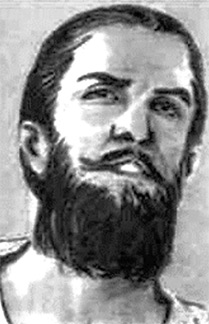Human Rights violations during foreign rule
by Rupa Banduwardena
Sri Lanka, the paradise isle, had been at one time in the middle of
the maritime silk route from China to Europe, making it a hub for
ancient trade. History reveals that Lanka was one of the great emporiums
in the East. It is said that Lanka had indigenous products such as gems,
pearls, elephants, ivory, valuable wood, textiles and spices such as
cloves, cardamoms, pepper and specially cinnamon supposed to be "the
finest in the world" in the words of the Dutch.
|

Puran Appu, a national hero |
Trade has been the forte in Dutch history and cinnamon has been the
very thing that brought the Dutch to explorers Sri Lanka. At a time when
modern day aviation was unheard of, the natural harbours around Lanka
such as Manthai (3-11 BC) in the north west Godawaya (1-10 BC) in the
south and Gokanna in the East were the busy sea ports engaged in import
and export trade.
There is a great deal of historical material from the Dutch period
regarding spices and trade of the island. It is said that there are
diary entries describing inspection tours made by Dutch governors to
cinnamon plantations. Such information is of much use to trace the
historical development in Sri Lanka.
Sri Lanka has experienced invasions. Starting with neighbouring South
India in the deep ancient period and later with the Portuguese Dutch and
the British. Going back to the Portuguese, the first Europeans to invade
the island, they occupied the maritime provinces.
The Portuguese arrived in 1505. Their control of the area caused
Sinhala people to move their capital to Kandy as the Hill Country was
looked upon as safer and secure against foreign invaders. Those who
disliked Portuguese welcomed any force which could redeem them. When the
Dutch landed in Sri Lanka in 1602.
The King of Kandy appealed for help. To be very brief, the Dutch
welcomed the idea. But it was not until 1660 that the Dutch could gain
power. By then they controlled the whole island except the Kingdom of
Kandy. It did not take long for the British, the last imperial power, to
establish their might in Ceylon, as called by them.
The British East India Company gained control of the island in 1796
declaring it a Crown Colony in 1802. The fall of the Kingdom of Kandy in
1815 unified the island under the British.
Though the country benefited during the latter stages, the British
rule was confined to the development of their own interests. It was
nothing but colonialism of the imperial masters who owned an empire
where sun never sets.
The most repulsive to hear, embedded in history bear testimony to the
displeasure of the entire nation.
"The last king of Lanka who fled the capital of Mahanuwara to escape
an enraged crowd was later located in a house at Meda Mahanuwara and
along with his queens were deported to Vellore in the ship Cornwallis.
His throne and crown were shipped to England. The flag of the nation,
Mani Mekhala the jewelled underwear of the queens and other valuable
possessions of the conquered race too were shipped and sold at London
auctions" thus terminating the age old royalty.
The never ending grievances over the misuse of civil rights religious
unrest, mistreatment and abuse of indigences by the imperial masters
gave rise to a struggle for freedom. The battle against the imperialists
began in 1817 in Uva culminating in the famous 1818 rebellion.
The next was the 1848 rebellion headed by great heroes such as Puran
Appu and Gongalegoda Banda whose names shine in the history.
The Kandyan glamour and grandeur and the aristocracy disappeared. The
most disgusting was their excise policy. Liquor was made available
everywhere in villages exposing them to all the vices on earth. Soon
there was evidence of discontent with British rule.
There was the Temperance Movement led by the Anagarika Dharmapala.
Still later in 1915 racial rivalry erupted into a riot against Muslims
which brought about the declaration of Martial Law, imprisoning of a
great national heroes.
The majority were totally against British rule. Only students of
history would know the exact truth whether there was even a wee bit of
humanitarian consideration among the colonial masters. It was a case of
human rights violations from the beginning to the end. |

